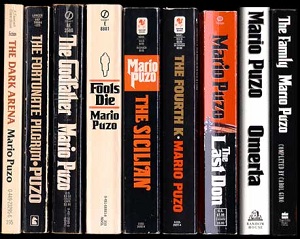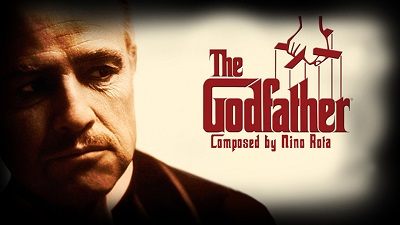I first watched Coppola’s The Godfather the summer before I went to film school. I sat down determined to watch all three, as well as explore the many Martin Scorsese films I had yet to see. When walking into a film with such monumental stature in film history and American culture, there is always the worry that it will fall short of your expectations, resulting in disappointment, or almost as worse, it will leave you with a cold, uninterested feeling – indifference.  Fortunately, neither happened, and I could not believe 1) how fast the three hours went by in the first film, and more importantly, 2) that as an Italian-American, I could claim this as an artistic achievement – one of my people contributed an absolute masterpiece, indelibly etched on the history of the medium I have devoted my life to!
Fortunately, neither happened, and I could not believe 1) how fast the three hours went by in the first film, and more importantly, 2) that as an Italian-American, I could claim this as an artistic achievement – one of my people contributed an absolute masterpiece, indelibly etched on the history of the medium I have devoted my life to!
 When I told my father (who is not Italian) that I had finally watched The Godfather, he told me how when he saw it in theaters, back in 1972, that he had actually read the book first. Now, that may not mean a lot for some people, but my dad rarely reads books of any length. He listens to audio books but generally musicians’ biopics (he was in a band and is still a DJ well into his 60s), so his willingness to read a 600 page book about an Italian-American mafia family was pretty big. And this was almost two decades before he met my mom, whose father came from the Sicilian town of Lentini. Most of my life, I have heard The Godfather theme drift up the stairs from the family room, and I knew instantly what my father was watching (but not why, for he is also a man who 99.9 percent of the time will not rewatch a film).
When I told my father (who is not Italian) that I had finally watched The Godfather, he told me how when he saw it in theaters, back in 1972, that he had actually read the book first. Now, that may not mean a lot for some people, but my dad rarely reads books of any length. He listens to audio books but generally musicians’ biopics (he was in a band and is still a DJ well into his 60s), so his willingness to read a 600 page book about an Italian-American mafia family was pretty big. And this was almost two decades before he met my mom, whose father came from the Sicilian town of Lentini. Most of my life, I have heard The Godfather theme drift up the stairs from the family room, and I knew instantly what my father was watching (but not why, for he is also a man who 99.9 percent of the time will not rewatch a film).
For a course some time ago, I was assigned to read parts of the original novel, and even a brief reading will provide a greater grasp of what Mario Puzo’s voice “added to the understanding of the Godfather phenomenon.” Obviously, he didn’t create it, because Italian  gangster films have existed as long as the medium has, and in general, a fascination with criminality, whether of the past (The Great Train Robbery) or of the present (Little Caesar, Scarface). Furthermore, the sensationalist appeal of such lurid subject matter has provided the medium of journalism with an endless supply of articles and editorials. However, what I think Puzo added was a relatability, a clear storytelling mode, a very understandable use of language, and an astute interweaving of mythology.
gangster films have existed as long as the medium has, and in general, a fascination with criminality, whether of the past (The Great Train Robbery) or of the present (Little Caesar, Scarface). Furthermore, the sensationalist appeal of such lurid subject matter has provided the medium of journalism with an endless supply of articles and editorials. However, what I think Puzo added was a relatability, a clear storytelling mode, a very understandable use of language, and an astute interweaving of mythology.
The best and most efficient way of relaying information is making a story, a mode with a
structure that goes back thousands of years and one people can understand, the same way we convey tales of history, the seemingly disconnected randomness of our dreams, and the monotonous routine of our everyday lives.
Also, centering the novel not necessarily on criminality, but on family, expectations, and how moments which link the two change us, also brings it back to a structure people can understand. Puzo himself claimed that he based the Don on his mother, not on a distant, infamous criminal like Al Capone or Lucky Luciano. Additionally, as Puzo is laying out some of the very dynamics of organized crime, he is also 1) adding more to the American cultural lexicon (consigliere, omertà, and Casa Nostra), and 2) showing it through the eyes of a relatively normal person – Michael. Michael, at the start is a college graduate and returning soldier with an ordinary girlfriend, Kay, and has no desire to enter that world which in some ways is as foreign to him as it is us.
Through Puzo’s writing, Michael briefly explains concepts he already knows (gabellotto)
but also provides a platform for alien codes to be explored, like the peripheral conflict between Don Tommassino and  the “new Mafia,” as well as more Italian- rather than Mafia-specific occurrences, like the “thunderbolt.” What I like a lot in Puzo’s work is what seems to be the constant conflict between the old and new, between Don Tommassino and the new Mafia in Palermo, Michael and Don Vito, Michael the youngest and the older, more arrogant and impetuous Sonny, between the old country (“Garden of Eden”) and America, the horseback riding “cowboy” Larry Angeluzzi in Puzo’s The Fortunate Pilgrim and the train he follows, and the contrast between the honor and respect of the older Mafia and the greed and corruption of the newer Mafia (despite their clear similarities).
the “new Mafia,” as well as more Italian- rather than Mafia-specific occurrences, like the “thunderbolt.” What I like a lot in Puzo’s work is what seems to be the constant conflict between the old and new, between Don Tommassino and the new Mafia in Palermo, Michael and Don Vito, Michael the youngest and the older, more arrogant and impetuous Sonny, between the old country (“Garden of Eden”) and America, the horseback riding “cowboy” Larry Angeluzzi in Puzo’s The Fortunate Pilgrim and the train he follows, and the contrast between the honor and respect of the older Mafia and the greed and corruption of the newer Mafia (despite their clear similarities).
As I read those brief sections, the language did evoke the beauty Michael (and presumably Puzo) sees in Sicily, in its groves and fields and vast agricultural landscape (“a land of gushing plenty”),  but it also conjured inextricably images of the film, of Michael meeting Apollonia with lupara in hand and the Nino Rota score, of the bruise under Michael’s eye and how he never tells Kay about his first marriage. Impatiently, I waited to see her behind the wheel and the inevitable car explosion. It’s the kind of moment, when taken in retrospect, where if it was this and not his revenge murder of McCluskey and Sollozzo that put him on the path of no return: “‘Tell my father to get me home,’ Michael said. ‘Tell my father I wish to be his son.’”
but it also conjured inextricably images of the film, of Michael meeting Apollonia with lupara in hand and the Nino Rota score, of the bruise under Michael’s eye and how he never tells Kay about his first marriage. Impatiently, I waited to see her behind the wheel and the inevitable car explosion. It’s the kind of moment, when taken in retrospect, where if it was this and not his revenge murder of McCluskey and Sollozzo that put him on the path of no return: “‘Tell my father to get me home,’ Michael said. ‘Tell my father I wish to be his son.’”
Furthermore, I’m sure the film and novel had a vital role in reinforcing long-held stereotypes regarding Italians and Italian-Americans, and a romanticized, sensationalist view of organized crime. However, in a larger context, The Godfather also serves as a masterful and cynical questioning of  institutions (in a time of the Vietnam War, the Pentagon Papers, Watergate, the end of Civil Rights optimism and American economic prosperity). Its core narrative follows the moral corruption of an idealistic American citizen (Michael) to the darker side of the American Dream, represented by the Italian-American mafia and the comprehensive degradation in the underbelly of American society, under the guise of a strong, united family unit (the unit that was considered the pivotal American structure of the country not two decades earlier).
institutions (in a time of the Vietnam War, the Pentagon Papers, Watergate, the end of Civil Rights optimism and American economic prosperity). Its core narrative follows the moral corruption of an idealistic American citizen (Michael) to the darker side of the American Dream, represented by the Italian-American mafia and the comprehensive degradation in the underbelly of American society, under the guise of a strong, united family unit (the unit that was considered the pivotal American structure of the country not two decades earlier).


Pingback: Offer He Can’t Refuse: The Conflict of Italian-American Identity in The Godfather (1972) | 24 Frames of Silver: A Cinema Blog for the Soul by Lee O.